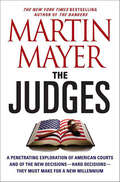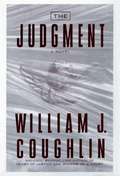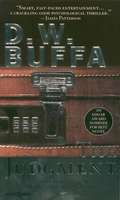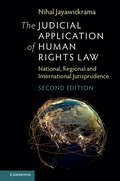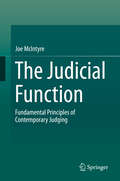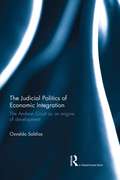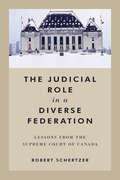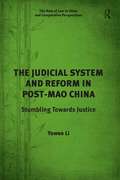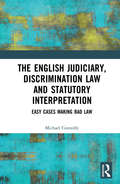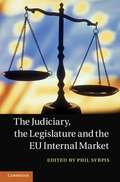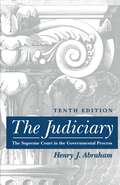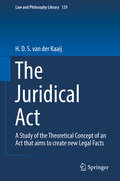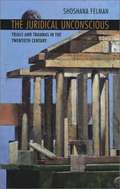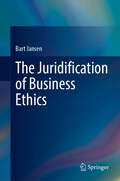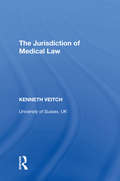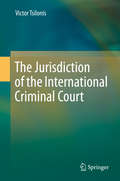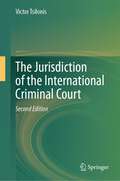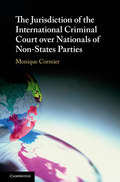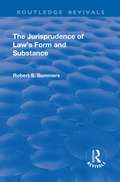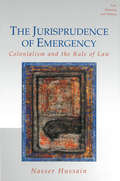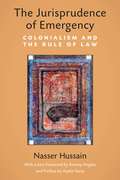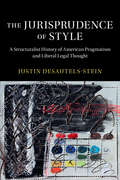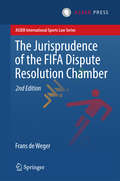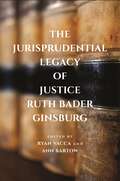- Table View
- List View
The Judges: A Penetrating Exploration of American Courts and of the New Decisions—Hard Decisions—They Must Make for a New Millennium
by Martin MayerOur courts, the third branch of the government, are central in the administration of our democracy. But their operations are shrouded in a mythology with its ritual incantations of "rule of law," "equal justice" and "presumption of innocence"--one that this book pierces. We have 30,000 judges. Many are hard-working and distinguished jurists; most are simply lawyers who knew a politician. It does not help that the job pays poorly. We have no judicial profession: we do not train judges before or after they mount the bench.There is no national court system. Fifty sovereign states, a federal government, counties and municipalities and state and federal agencies all have their own courts, their own rules and not infrequently their own laws and are deluged with cases filed by a million lawyers. Today, less than 3% of criminal charges and 4% of civil disputes are resolved by court trials.The noted author argues that a specialized world demands specialized courts and judges expert in the subjects they must consider. Following the leadership of Chief Judge Judith Kaye of New York's highest court, the Conference of Chief Justices from all fifty states has endorsed her use of "problem-solving courts" to take the judiciary into the twenty-first century. The Judges is Martin Mayer's most important book from many successful titles dating from the 1950s. It opens up a debate that will occupy scholars, justices, many of the one million lawyers in our country, and law school professors and students for years to come.
The Judgment (A Charley Sloan Novel)
by William J. CoughlinAs winter descends upon Detroit, ace lawyer Charley Sloan is drawn into a case that involves the bizarre murders of small children. Someone is killing them, bathing their bodies and washing their clothes, wrapping them in plastic, and then placing them in the new-fallen snow, laid out like little angels, peacefully asleep. The serial murders seem unsolvable, for the killer is elusive and very clever. Meanwhile, Detroit's powerful police chief, Mark Conroy, asks Charley to defend him against charges that he stole millions from the department's secret cash fund, a fund meant to pay off informants. It's a case that grabs headlines and is fraught with scandal, politics, and graft. Charley has to find the real embezzler before an innocent man is put away and his own career is ruined. Once again, Charley finds himself torn between two big cases that hurtle him into a web of danger and deceit in this novel peopled with a variety of believable, complex characters which offers glimpses into the working and personal lives of lawyers, cops, clergy, public servants and the people, good and bad, they serve.
The Judgment (Joseph Antonelli #3)
by D. W. BuffaWhen Judge Calvin Jeffries becomes the first sitting judge to be murdered while serving in office, charismatic criminal defense attorney Joseph Antonelli finds himself smack in the middle of a riveting case. As he works through the intricacies of a homicide audacious enough to strike at the heart of justice, the ensuing investigation and trial reveal a deadly trail of evil, shattered lives, and revenge. While challenging traditional notions of crime and punishment, the novel also calls into question the very principles of our judicial system and marks the breakthrough of a master storyteller.
The Judicial Application of Human Rights Law: National, Regional and International Jurisprudence
by Nihal JayawickramaSince the 1948 Universal Declaration of Human Rights, over 140 countries have incorporated human rights standards into their legal systems: the resulting jurisprudence from diverse cultural traditions brings new dimensions to concepts first articulated in the 1948 Declaration. Nihal Jayawickrama draws on all available sources to encapsulate the judicial interpretation of human rights law in one ambitious, comprehensive volume. Jayawickrama covers the case law of the superior courts of over eighty countries in North America, Europe, Africa, Asia, and the Pacific, and the jurisprudence of the UN Human Rights monitoring bodies, the European Court of Human Rights, and of the Inter-American system. He analyses the judicial application of human rights law to demonstrate empirically the universality of contemporary human rights norms. This definitive compendium will be essential for legal practitioners, government and non-governmental officials, as well as academics and students of both constitutional law and the international law of human rights.
The Judicial Function: Fundamental Principles of Contemporary Judging
by Joe McIntyreJudicial systems are under increasing pressure: from rising litigation costs and decreased accessibility, from escalating accountability and performance evaluation expectations, from shifting burdens of case management and alternative dispute resolution roles, and from emerging technologies. For courts to survive and flourish in a rapidly changing society, it is vital to have a clear understanding of their contemporary role – and a willingness to defend it. This book presents a clear vision of what it is that courts do, how they do it, and how we can make sure that they perform that role well. It argues that courts remain a critical, relevant and supremely well-adjusted institution in the 21st century. The approach of this book is to weave together a range of discourses on surrounding judicial issues into a systemic and coherent whole. It begins by articulating the dual roles at the core of the judicial function: third-party merit-based dispute resolution and social (normative) governance. By expanding upon these discrete yet inter-related aspects, it develops a language and conceptual framework to understand the judicial role more fully. The subsequent chapters demonstrate the explanatory power of this function, examining the judicial decision-making method, reframing principles of judicial independence and impartiality, and re-conceiving systems of accountability and responsibility. The book argues that this function-driven conception provides a useful re-imagining of some familiar issues as part of a coherent framework of foundational, yet interwoven, principles. This approach not only adds clarity to the analysis of those concepts and the concrete mechanisms by which they are manifest, but helps make the case of why courts remain such vital social institutions. Ultimately, the book is an entreaty not to take courts for granted, nor to readily abandon the benefits they bring to society. Instead, by understanding the importance and legitimacy of the judicial role, and its multifaceted social benefits, this books challenge us to refresh our courts in a manner that best advances this underlying function.
The Judicial Politics of Economic Integration: The Andean Court as an Engine of Development
by Osvaldo SaldiasThe Judicial Politics of Economic Integration analyses development strategies and regional integration in the Andean Community (the former Andean Pact), focusing on the establishment of the Andean Court of Justice and its case law, as well as the intellectual underpinnings that made such an impressive reform possible. The court is a transplant taken from the European integration process, and it materializes the visions, expectations, and dreams of the transnational development movement of "integration through law". The book discusses the outcomes of the Court in light of the debates about judicial reform in the process of development and regional integration. Although clearly confirming several earlier claims that "one size does not fit all", Osvaldo Saldias provides new insights into how legal transplants adapt and evolve, and how we can learn much more about legal reform from a project that presumably failed than from successful copies. The Andean Court of Justice is a remarkable example of an institution capable of adapting to political and economic challenges; therefore, in times of a severe European economic crisis we should not forget that we might improve our understanding of European integration by looking at developments in other regions. An interesting new study with an international focus, this book will be a fascinating read for students and scholars of Law and Latin American Studies.
The Judicial Role in a Diverse Federation: Lessons from the Supreme Court of Canada
by Robert SchertzerIn The Judicial Role in a Diverse Federation, Robert Schertzer uses the example of the Supreme Court of Canada to examine how apex courts manage diversity and conflict in federal states.Schertzer argues that in a diverse federation where the nature of the federal system is contested the courts should facilitate negotiation between conflicting parties, rather than impose their own vision of the federal system. Drawing on a comprehensive review of the Supreme Court federalism jurisprudence between 1980 and 2010, he demonstrates that the court has increasingly adopted this approach of facilitating negotiation by acknowledging the legitimacy of different understandings of the Canadian federation.This book will be required reading both for those interested in Canada's Supreme Court and for those engaged in broader debates about the use of federalism in multinational states.
The Judicial System and Reform in Post-Mao China: Stumbling Towards Justice (The Rule of Law in China and Comparative Perspectives #1)
by Yuwen LiThis comprehensive study examines the development and changing characteristics of the judicial system and reform process over the past three decades in China. As the role of courts in society has increased so too has the amount of public complaints about the judiciary. At the same time, political control over the judiciary has retained its tight-grip. The shortcomings of the contemporary system, such as institutional deficiencies, shocking cases of injustice and cases of serious judicial corruption, are deemed quite appalling by an international audience. Using a combination of traditional modes of legal analysis, case studies, and empirical research, this study reflects upon the complex progress that China has made, and continues to make, towards the modernisation of its judicial system. Li offers a better understanding on how the judicial system has transformed and what challenges lay ahead for further enhancement. This book is unique in providing both the breadth of coverage and yet the substantive details of the most fundamental as well as controversial subjects concerning the operation of the courts in China.
The Judiciary I Served
by P. Jaganmohan ReddyThe Judiciary I Served describes the long and distinguished career in law of an eminent jurist from his early days as a barrister to his retirement from the Supreme Court of India.
The Judiciary, Discrimination Law and Statutory Interpretation: Easy Cases Making Bad Law
by Michael ConnollyIn 1856, the US Supreme Court denied Dred Scott, now free of slavery, his Constitutional rights, solely because he was black. According to the Court, when the Constitution was drafted, some 60 years earlier, its authors would not have intended that ‘a subordinate and inferior class of beings’ qualified as citizens of the United States. Thus, the meaning of language drafted over half a century before was frozen in time. This case, perhaps more than any other, demonstrates that the matter of statutory interpretation is critical, technical, and, sometimes, highly emotive. The case is not a mere nugget from history to indulge our disgust with values of another age, and with it a satisfaction of our progress to today’s higher moral ground. It is the unfortunate case that the senior courts of England continue to produce highly contentious interpretations of our equality and discrimination laws. This book examines these cases from the perspective of statutory interpretation, the judge’s primary function. The scrutiny finds the judgments technically flawed, overcomplicated, excessively long, and often unduly restrictive. As such, this book explains how the cases should have been resolved – using conventional methods of interpretation; this would have produced simpler, technically sound judgments. Rather like the case of Dred Scott, these were easy cases producing bad law.
The Judiciary, the Legislature and the EU Internal Market
by Philip SyrpisBy tracing the way in which the CJEU and national courts react to legislation and Treaty reform, and the way in which the Member States, Commission and other actors in the legislative process react to judicial interventions, this collection of essays explores the nature of the dynamic relationship between courts and legislatures within the EU. It is clear that the boundaries between the legal and political realms are contested and that the judiciary and the legislature are engaged in a struggle, not so much about the substantive contours of the internal market project, but rather about their relative institutional positions. The contributors consider all aspects of the internal market project, from goods to capital and citizenship, examining areas where there has been significant Treaty change as well as those in which the Treaty framework has remained substantially unaltered.
The Judiciary: Tenth Edition
by Henry J. AbrahamRevised and updated to include the latest Supreme Court decisions, this classic text, now in its tenth edition, provides a concise overview of the judiciary in general and the Supreme Court in particular. The only book available that combines theory and practice of the judicial process with civil rights and liberties, The Judiciary acquaints students with the intricacies of our courts, the people who compose them, and their relationship to other branches of government, as well as to individuals and groups.
The Juridical Act: A Study of the Theoretical Concept of an Act that aims to create new Legal Facts (Law and Philosophy Library #129)
by H. D. van der KaaijThis book puts forward a new theoretical concept of the juridical act, this concept is not described from the perspective of a specific national legal system, but instead represents the commonalities and ideas that stem from the Western legal tradition. Since the concept is system-independent, it does not rely on national or state laws.The book begins by detailing those characteristics that distinguish juridical acts from the general group of acts. It offers clear distinctions between the different aspects of juridical acts, such as the power and the competence needed in order to perform the act, the fact that juridical acts are constitutive speech acts, and the rules that connect the act with its consequences. In the process, the book dispels much of the haziness currently surrounding juridical acts.Developed with a mix of theory and practice, this new concept is better equipped to deal with modern trends and practices. Further, since the author has freed the idea of the juridical act from the bonds of history and geography, it is also more suited to facilitating a better understanding of and explaining changes in the legal landscape, such as the rise of computer technology. Accordingly, it offers scholars and practitioners alike a valuable new tool for explaining and theorizing about the law.
The Juridical Unconscious: Trials and Traumas in the Twentieth Century
by Shoshana FelmanDeath, wrote Walter Benjamin, lends storytellers all their authority. How do trials, in turn, borrow their authority from death? This book offers a groundbreaking account of the surprising interaction betweenm trauma and justice.
The Juridification of Business Ethics
by Bart JansenThis book provides a theory of the juridification of business ethics. Ethical codes pop up everywhere in the business world and increasingly resemble the code of law. A focus on compliance rather than reflection becomes the norm. Legal perspectives replace ethical perspectives, turning ethicists into lawyers without a law degree. This juridification of business ethics conceals a diminishing trust in ethics, as legal reasoning substitutes philosophical thinking. By appealing to the critical study of law, Bart Jansen advocates for a renewed focus on the ethical side of business. This book shows the importance of a good balance between law and ethics in business and is of great interest to both academics and professionals.
The Jurisdiction of Medical Law (Medical Law And Ethics Ser.)
by Kenneth VeitchThis book offers a critical analysis of some of the guiding principles and assumptions that have been central to the development and identity of medical law. Focusing on several key cases in the field - including the 'Dianne Pretty' and 'Conjoined Twins' cases - the book scrutinizes the notions of autonomy and human rights, and explores the relationship between medical law and moral conflict. It also asks what role, if any, the courts might play in stimulating public debate about the ethics of controversial developments in medicine and biomedical science. This innovative book will be of interest to academics and students working in the areas of medical law, legal theory, bioethics and medical ethics. It will also appeal to those within the medical and health care professions seeking a critical analysis of the development and operation of medical law.
The Jurisdiction of the International Criminal Court
by Victor TsilonisThe book provides a holistic examination of the jurisdiction of the International Criminal Court (ICC). The main focus is placed on the three pillars which form the ICC’s foundation pursuant to the Rome Statute:the preconditions to the exercise of its jurisdiction (Article 12 Rome Statute)the substantive competence, i.e. the core crimes (Article 5-8bis Rome Statute, i.e. genocide, crimes against humanity, war crimes, crime of aggression) the principle of complementarity (Article 17§1 (a) Rome Statute) The latter governs the ICC's ‘ultimate jurisdiction’, since it is not merely sufficient for a crime to be within the Court's jurisdiction (according to the substantive, geographical, personal and temporal jurisdictional criteria), but the State Party must also be unwilling or unable genuinely to carry out the investigation or prosecution. Finally yet importantly, the main ‘negative preconditions’ for the Court’s jurisdiction, i.e. immunities (Article 27 Rome Statute) and exceptions via Security Council referrals are thoroughly examined.The book is an excellent resource for scholars as well as practitioners and notably contributes to the existing literature.
The Jurisdiction of the International Criminal Court
by Victor TsilonisThis book embarks on a comprehensive exploration of the jurisdiction of the International Criminal Court (ICC) and elucidates the three foundational aspects of its jurisdiction as laid out in the Rome Statute: the preconditions for exercising jurisdiction (Article 12 ICCRSt), its substantive competence regarding core crimes (Articles 5-8bis ICCRSt), and the principle of complementarity (Article 17§1(a) ICCRSt).This principle, crucial to understanding the ICC’s ‘ultimate jurisdiction’, is invoked only when a State Party demonstrates an inability or unwillingness to genuinely undertake investigation or prosecution. The book further probes the ‘negative preconditions’ of the Court’s jurisdiction, in particular, immunities (Article 27 ICCRSt) and exceptions through Security Council referrals (Articles 13(b) and 15 ICCRSt).Intended for students, scholars, and practitioners alike, this second edition offers invaluable insights into the ICC’s jurisdiction, making a notable contribution to the existing literature. Importantly, it also navigates emerging fields of international criminal law, addressing topical and thought-provoking subjects such as ecocide, cyber warfare, automated lethal weapons, artificial intelligence, and the legal complexities arising from the Russian invasion of Ukraine.
The Jurisdiction of the International Criminal Court over Nationals of Non-States Parties
by Monique CormierThis book provides a systematic and comprehensive analysis of the ICC's jurisdiction over nationals of non-States Parties. It is within the context of developments at the Court in recent years that this work addresses the overarching question: On what legal basis is the ICC authorised to exercise jurisdiction over nationals of non-States Parties? Engaging with ICC jurisprudence and building upon arguments developed in legal scholarship, this book explores the theory of delegated jurisdiction and critically examines the idea that the Court might alternatively be exercising jurisdiction inherent to the international community. It argues that delegation of territorial jurisdiction and implied consent by virtue of UN membership provide a legal basis to allow the ICC to exercise jurisdiction over nationals of non-States Parties in almost all situations envisaged by the Rome Statute.
The Jurisprudence of Law's Form and Substance (Routledge Revivals)
by Robert S. SummersThis title was first published in 2000: Robert S. Summers is a distinguished legal theorist whose work has had significant influence in Europe as well as the United States. The study of form and substance in law, the theme of this collection, marks many of his most distinctive contributions to law and legal philosophy over four decades.
The Jurisprudence of Emergency
by Nasser HussainHussain analyses the uses and the history of a range of emergency powers, such as the suspension of habeas corpus and the use of military tribunals. His study focuses on British colonialism in India from the late eighteenth to the early twentieth century to demonstrate how questions of law and emergency shaped colonial rule, which in turn affected the place of colonialism in modern law, depicting the colonies not as passive recipients but as agents in the interpretation and delineation of Western ideas and practices. Nasser Hussain is Professor of History at Amherst College.
The Jurisprudence of Emergency: Colonialism and the Rule of Law (Law, Meaning, And Violence)
by Nasser HussainThe Jurisprudence of Emergency examines British rule in India from the late eighteenth to the early twentieth century, tracing tensions between the ideology of liberty and government by law used to justify the colonizing power's insistence on a regime of conquest. Nasser Hussain argues that the interaction of these competing ideologies exemplifies a conflict central to all Western legal systems—between the universal, rational operation of law on the one hand and the absolute sovereignty of the state on the other. The author uses an impressive array of historical evidence to demonstrate how questions of law and emergency shaped colonial rule, which in turn affected the development of Western legality. The pathbreaking insights developed in The Jurisprudence of Emergency reevaluate the place of colonialism in modern law by depicting the colonies as influential agents in the interpretation of Western ideas and practices. Hussain's interdisciplinary approach and subtly shaded revelations will be of interest to historians as well as scholars of legal and political theory.
The Jurisprudence of Style: A Structuralist History Of American Pragmatism And Liberal Legal Thought (Cambridge Historical Studies In American Law And Society Series)
by Justin Desautels-SteinIn the contemporary domain of American legal thought there is a dominant way in which lawyers and judges craft their argumentative practice. More colloquially, this is a dominant conception of what it means to 'think like a lawyer'. Despite the widespread popularity of this conception, it is rarely described in detail or given a name. Justin Desautels-Stein tells the story of how and why this happened, and why it matters. Drawing upon and updating the work of Harvard Law School's first generation of critical legal studies, Desautels-Stein develops what he calls a jurisprudence of style. In doing so, he uncovers the intellectual alliance, first emerging at the end of the nineteenth century and maturing in the last third of the twentieth century, between American pragmatism and liberal legal thought. Applying the tools of legal structuralism and phenomenology to real-world cases in areas of contemporary legal debate, this book develops a practice-oriented understanding of legal thought.
The Jurisprudence of the FIFA Dispute Resolution Chamber
by Frans De WegerThis book addresses the most important judicial aspects in relation to the Dispute Resolution Chamber (DRC), as well as the different categories of disputes, inter alia, the termination of player contracts, the amount of compensation, sporting sanctions, training compensation and the solidarity mechanism. The DRC was established in 2001 by FIFA for the purpose of resolving disputes regarding the international status and transfer of players. Since then the DRC has developed into a major and influential alternative resolution body, with an impressive and ever-increasing caseload. In this updated and revised Second Edition the most important decisions of the DRC as of the date of its establishment in 2001 until 2016 are analysed. It is a reference work for those with a legal and financial interest in professional football, such as lawyers, agents, managers and administrators, but is also aimed at researchers and academics.
The Jurisprudential Legacy of Justice Ruth Bader Ginsburg
by Ryan Vacca Ann BartowProvides a sweeping overview of Justice Ginsburg’s jurisprudenceThe passing of Justice Ruth Bader Ginsburg in September of 2020 marked a grim day for women and the broader progressive legal community. In her twenty-seven years on the Supreme Court and thirteen years on the Court of Appeals, she was most known for her trailblazing work on gender equality; however, she also influenced the direction of a multitude of legal subject areas during her long tenure. The Jurisprudential Legacy of Justice Ruth Bader Ginsburg is a critical examination of Justice Ginsburg’s remarkable career, with a focus on the common themes and approaches underscoring her many rulings.In this edited volume, Ryan Vacca and Ann Bartow bring together leading scholars of American law to analyze Justice Ginsburg’s voting patterns and written opinions from the perspectives of subject matter experts. Each essay highlights areas of the law in which Justice Ginsburg had an outsized interest or impact. Chapters delve into topics such as gender equality, voting rights, the death penalty, civil and criminal procedure, employment discrimination, freedom of expression, bankruptcy, environmental law, immigration, and taxation. Together, they form a colorful tapestry that illustrates a long and celebrated judicial career, displaying Ginsburg’s immense influence on areas of the law well beyond women’s rights.The Jurisprudential Legacy of Justice Ruth Bader Ginsburg shares profound insights into its subject’s unique legal philosophy, and reminds us what we had and whom we lost with her passing.
